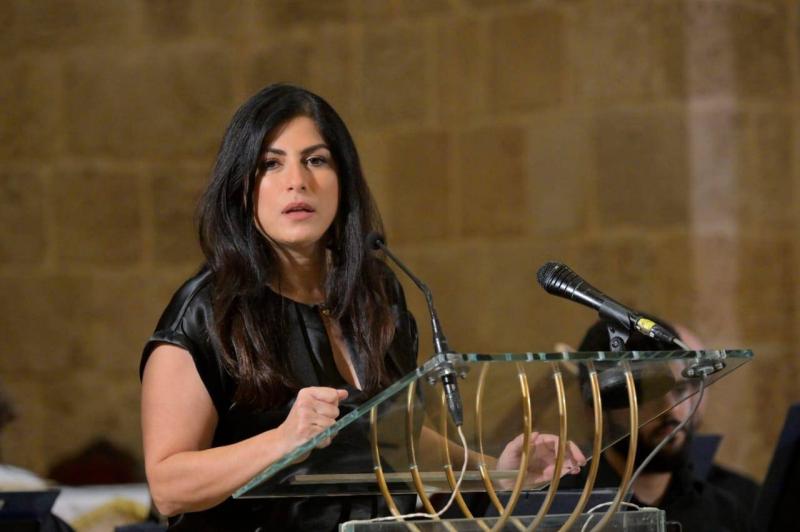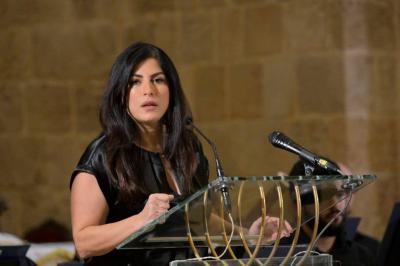Invited by the President of the National Higher Institute of Music, composer Hiba Kawas, the Lebanese Philharmonic Orchestra held a musical concert conducted by Maestro Garo Avissian, with Aaron Rivas playing the organ, at the St. Louis Cathedral for the Capuchin Fathers in downtown Beirut. This event was part of the "Organ Festival in Lebanon: the Ninth Lebanese Pipe Organ Week," in collaboration with the Spanish Embassy in Lebanon, the University of Notre Dame in Louaizeh, the Organ Festival in the Holy Land, and the Lebanese Week of the Organ.
The celebration was attended by the Ambassadors of Spain, Jesús Santos Aguado, and Australia, Andrew Barnes, the accredited Ambassador of the Order of Malta in Lebanon, Maria Cortesi, the first secretary at the Papal Embassy, Monsignor Giuseppe Bichieri, the representative of the Minister of Culture, Amina Berri, the representative of the Organ Festival in the Holy Land, Riccardo Ceriani, the Director of the UNESCO Regional Office in Beirut, Costanza Farina, the former ministers Mohammad Machnouk and Tarek Mitri, as well as diplomatic, political, religious, cultural, and media figures, alongside a large audience of classical music enthusiasts.
The evening was opened by the Prior of the St. Louis Monastery and Cathedral, Father Eli Rahma, who welcomed the attendees on behalf of the regional president of the Capuchin Order, Father Abdallah Nifli. He stated, "The Cathedral serves the Latin Church in Lebanon, headed by His Excellency Bishop Cesar Azaian, the Apostolic Vicar for Latins in Lebanon." Rahma added, "After the war of 1975, the organ that was in the church was stolen, and since then the church has been without a large church organ. However, thanks to benefactors and generous hands, we have had this instrument for a year now." He thanked those who contributed to this work, namely the Jean-Louis Mainguit Foundation, Nabil Katona Foundation, and the Order of Malta. He also thanked the organizers of the concert, especially the President of the National Conservatory and all the parties that collaborated with the institute to hold this event.
Following him, Father Khalil Rahma, founder of the "Lebanese Week of the Organ," music professor at the conservatory, choir director, and music school teacher at the University of Notre Dame in Louaizeh, expressed his gratitude to the conservatory and everyone who contributed to the evening's success, explaining the importance of the instrument and the Organ Festival in Lebanon, its objectives, and the necessity of organizing it.
A speech from the President of the conservatory, Hiba Kawas, expressed: "Tonight is different from our weekly concerts because it holds a lot of significance, and it is dedicated to this unique instrument and the ninth Lebanese week of the organ which includes all these figures committed to celebrating the organ as it deserves, and who care about music in Lebanon. We take pride in you and all these efforts. The organ is a very special and rare instrument in Lebanon, and now is the time to support this instrument and have musicians and friends of it. As a national music institution, we are happy to celebrate it in collaboration with you, as it is one of the ancient historical instruments, and because we are keen on musical culture, this is our role, and our message that we continue despite all the surrounding circumstances. We are determined to continue indefinitely in preserving our cultural identity, and music and the conservatory represent this identity..."
Before the maestro entered to conduct the orchestra, the melodious sound of the organ, placed in the internal balcony of the church overlooking the altar and the attendees, filled the upper level of the cathedral, adding a sense of dignity to the event, along with the atmosphere of reverence brought by this enormous musical instrument, currently used in church music. It possesses a refined and profound musical ambiance, emanating its unique sounds. In addition to the grandeur of this music, which rivals its richness, diversity of melodies, harmonies, and rhythms, the beauty of the decorations and carvings adorning its exterior adds to its majestic presence. Its historical roots are deep, making it difficult to pinpoint the exact date and inventor of the organ, but the earliest mention of this instrument dates back to 250 BC, when the Greek engineer Ctesibius of Alexandria was credited with the first organ creation.
Spanish musician Aaron Rivas, who was the master of the organ for the evening, demonstrated his expertise on the instrument, captivating the audience with his impressive performance from the elevated position of this stunning machine, akin to a celestial sound scattering melodies among the churchgoers, or like drops of rain refreshing the soul that thirsts for beauty and musical enchantment. Complementing this presence was Maestro Garo Avissian conducting the Philharmonic Orchestra, known for its elegance and skill in performing classical Lebanese music, led by a professional conductor mastering the instruments, arrangement, and management.
The unique organ evening featured some of the most delicate and refined symphonies by Bach (Prelude and Fugue in C Major), C. Debussy (Suite Bergamasque, Claire de Lune), M. Migo (Toccata Iberica), Strauss (Die Fledermaus Overture), Mozart (Symphony No. 35), and Wider (Symphony for Pipe Organ and Orchestra Op. 42), transporting the audience to the heights of musical and spiritual enjoyment.




